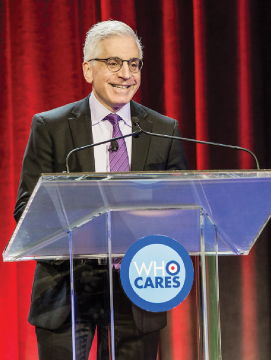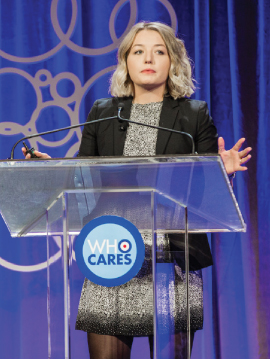This past December, nearly 400 medical professionals from a variety of fields—including medical oncology, palliative care, science, nursing, social work, and psychology—and 23 countries traveled to Atlanta, to attend the 2nd Global Adolescent & Young Adult (AYA) Cancer Congress. The 3-day conference featured 170 study abstracts from researchers around the world and 8 sessions ranging from advocacy and models of treatment and support to the latest advances in the treatment of cancers in young adults.
Among the highlights of the conference was a panel discussion by five young adult cancer survivors about their cancer experience. Every session of the conference was also co-chaired by a young adult cancer survivor and a health-care professional.
The event was cosponsored by Teen Cancer America, a nonprofit organization founded by Roger Daltrey and Pete Townshend of the rock group The Who; Teenage Cancer Trust, a British-based charity; and CanTeen Australia, a national support organization for young adults impacted by cancer; in partnership with Critical Mass: The Young Adult Cancer Alliance.
One session, “Breaking New Ground in Scientific and Clinical Research,” included a presentation by John P. Perentesis, MD, FAAP, Director of Oncology and Cancer Programs, Professor of Pediatrics, and Kleisinger Chair for Novel Cancer Treatments at Cincinnati Children’s Hospital Medical Center, and focused on what the future of treatment for adolescent and young adult cancer survivors will entail. “Precision genomics in AYA cancers is the evolving standard of care [for this age group],” said Dr. Perentesis. He highlighted the importance of molecular characterization of leukemias at diagnosis for selection of a therapeutic regimen and the critical role of genomics in guiding effective treatment for relapse. “Genomic-targeted small-molecule drugs, immune and gene therapies, precision radiation/particle therapy, and ultrasound will transform care for these patients.”
Global Cancer Burden Among AYAs
According to the National Cancer Institute, each year, about 70,000 individuals between the ages of 15 and 39 years are diagnosed with cancer in the United States.1 The most common cancers in this population include brain, breast, cervical, colorectal, liver, testicular, and thyroid cancers; germ cell tumors; sarcomas; melanoma; and leukemia and lymphoma. And while overall survival rates for patients with cancer continue to soar—with 15.5 million cancer survivors in the United States today2—most of that gain is among pediatric and older adult patients.

John P. Perentesis, MD, FAAP, presents his findings about what the future of young adult cancer care will look like during the Global Adolescent & Young Adult Cancer Congress.

New research presented by Miranda M. Fidler, PhD, at the Global Adolescent & Young Adult Cancer Congress shows that the global cancer burden among this age group varies substantially and that the impact is considerable due to premature morbidity and mortality. Photographs by Dwayne C. Bass Photography
Worldwide, the cancer burden among this age group is staggering. In 2012, over 975,000 young adults were diagnosed with cancer, and over 358,000 died of the disease, with women experiencing a greater disproportion in cancer incidence (64.9% vs 35.1%) and deaths (54.3% vs 45.7%) than men, respectively, according to research by Miranda M. Fidler, PhD, of the Section of Cancer Surveillance at the International Agency for Research on Cancer in Lyon, France, and a presenter at the Global AYA Cancer Congress.3
Multiple factors are contributing to the survival rate disparities in this population, including age-related differences in tumor biology, lower adherence to prescribed therapy, delayed access to care, poor awareness of AYA cancers among medical personnel, stigma,
affordability of care, lack of early screening and prevention strategies, and uncertainty about the most effective treatment protocols. Greater progress can be achieved to reduce the global cancer burden among AYAs and improve their survival rates, said Dr. Fidler, through raising awareness of the risks of cancer in young adults, implementing effective prevention and early-detection strategies, and advancing risk-stratification and treatment protocols through clinical trials.

We are learning that cancers and their treatments react differently in this age group. We need to increase AYA participation in clinical trials to understand why.— Simon Davies
Tweet this quote
“We are learning that cancers and their treatments react differently in this age group. We need to increase AYA participation in clinical trials to understand why,” said Simon Davies, Executive Director of Teen Cancer America. “There are many reasons why participation in clinical studies remains low among this population, including lack of access to studies in the community setting and poor communication by some medical staff on the process of clinical trials. Trials need to be explained in language that people can easily understand. Why there isn’t greater AYA participation in clinical trials is a complex issue, but I think the biggest problem is lack of access.”
Lessons From the Military
A new panel session that drew a lot of attention at this year’s meeting focused on lessons that can be learned from the military about how cancer and its treatments affect young adults and how studying this patient population might improve overall AYA survival rates.
“This session really excited me because the U.S. military is the largest employer of young adults in the world, and it collects comprehensive data on cancer incidence and survival rates among all military personnel, including active-duty and retired members, as
well as Reserve and National Guard members, but there are few studies on cancer incidence in the U.S. military compared to the general population,” said Mr. Davies. “I think this offers the oncology community a fantastic opportunity to develop large research studies with the Department of Defense and other U.S. military agencies to investigate how the military’s health system screens for cancer, treats cancers once they are detected, and supports cancer survivors. It is a new area that we plan to explore at the next Global AYA Cancer Congress.”
Working Together to Find Cures
What makes the Global AYA Cancer Congress unique from other meetings, said Mr. Davies, is the international participation of pediatric and medical oncologists, scientists, radiation oncologists, nurses, psychologists, and other medical experts interested in improving care and outcomes for AYAs with cancer, as well as the active engagement of young adult survivors in program development.
“Most other oncology conferences focus on specific tumor types and do not address the many crossover issues regarding the most effective treatment settings—pediatric or young adult oncology—these young survivors face. We bring a multidisciplinary approach to understanding the challenges in treating this population, both physically and emotionally, and we encourage young adult survivors to participate in the development of our programs. They are becoming the decision-makers in this new field.” ■
DISCLOSURE: Drs. Perentesis and Fidler reported no conflicts of interest.
REFERENCES
1. National Cancer Institute: Adolescents and young adults with cancer. Available from www.cancer.gov/types/aya. Accessed January 2, 2018.
2. National Cancer Institute Division of Cancer Control & Population Sciences: Statistics. Available at cancercontrol.cancer.gov/ocs/statistics/statistics.html. Accessed January 2, 2018.
3. Fidler MM, Gupta S, Soerjomataram, et al: Cancer incidence and mortality among young adults aged 20-39 years worldwide in 2012: A population-based study. Lancet Oncol 18:1579-1589, 2017.
SAVE THE DATE
The 3rd Global Adolescent & Young Adult Cancer Congress will be held on December 4–6, 2018, in Sydney, Australia. For additional information, visit ayaglobalcancercongress.com.

